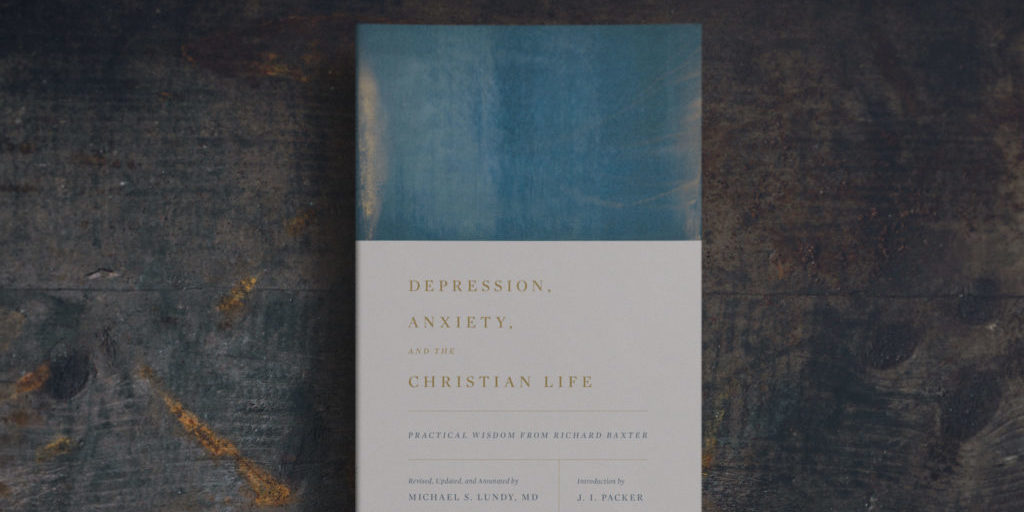
Book Review: Practical Wisdom from Richard Baxter on Depression, Anxiety, and the Christian Life
Written by J.I. Packer and Michael Lundy, Depression, Anxiety, and the Christian Life helps to counteract the mode in which sin and death can express themselves in our lives (namely, depression). They view the works of Baxter to be integral to this counteractant. In the Preface (note to reader: always read the Preface of a book), Packer states, that “…[we] came to think that a mini-treatise by Baxter that, at its heart, sought to serve the depressed would, if republished in a modern edition, be a valuable resource for pastoral care of depressed persons in today’s churches” (Packer, 9). I am not sure I could muster a more hearty “Amen.”
We evangelicals are living in an era where we are rediscovering the responsibilities Christians (especially those in covenant church membership) have to one another. And among our church members are those beset by depression and anxiety– and we are failing our church members if we simply outsource our counseling ministry (though there is a place for that). Part of speaking the truth (the content of our communication) in love (the mode and impetus of our communication) is counseling one another. Baxter helps us understand why counseling a depressed soul is important: “…the disease we call melancholy–depression–is opposed to the very sense of the gospel….under the influence of depression, all that Christ has accomplished, purchased, offered, and guaranteed appears to be of only dubious repute and, even where true, a cause more for sadness than for joy” (Baxter, 112). Depression robs us of the joy we inherit as the beneficiaries of God’s reconciliatory act in Christ. It is through this frame that I offer this book as an immensely helpful guide to aid us in carrying one another’s burdens (Gal 6:2) and a means by which we may help one another to fight our depressive tendencies.
Exposing the Puritans for What They Were
All at once, the book helps to dispel myths that surround the Puritans. The populace, armed with an understanding of the Puritans informed by a cursory reading of Sinners in the Hands of an Angry God in their high school English class, conclude that the Puritans were emotionally immature at best and emotionally violent at worst. I defy you, however, to read this book and tell me that the Puritans were incapable of warm and affectionate emotion. Read Baxter, “Where you find yourselves incapable of private devotions, don’t be too hard on yourselves. Instead, go at a pace that is not too uncomfortable. Why? Because every effort that does not enable you only hinders you, makes duty wearisome to you, and further disables you by worsening your condition” (Baxter, 87). Baxter’s work does not read like a diatribe, but a letter from a loving shepherd to his hurting sheep. The Puritans, unsurprisingly enough, have a rich history of pastoral care. A book like this helps our brothers and sisters feel the warmth and love that oozes from men like Baxter, Sibbes, Burroughs, or even Edwards. And, hopefully, after seeing their pastoral love and concern for their soul, they are encouraged to dive deep into the well of Puritan soul care.
Another myth is that the Puritans were simply unconcerned with physical realities. Packer and Lundy make abundantly clear this is not the case. Packer says, “They knew…that each human being is a psychophysical unit, in which the body and the mind, though distinct, are currently inseparable, and either may make its mark functionally on the other, for better and for worse” (Packer, 27, emphasis mine). Or Lundy, “Baxter wrote about the care of the soul and the care of the body as if they were indivisible if not indistinguishable components of the same person” (Lundy, 41). On Puritanism, then, humans are not bags of meat–they are embodied souls Baxter makes it explicitly clear to attend to both the soul and the body. As we seek to counsel our brothers and sisters, we should balance these two.
Baxter’s Counsel Is Imminently Spiritual, Thus Theological
As Baxter believes that we are souls, he offers spiritual counsel. Indeed, his first prescription for combatting depression is contemplative: “Be sure that a theological error is not the root of your distress. Especially have a solid understanding of the covenant of grace and the riches of mercy revealed in Christ” (Baxter, 84). Baxter purposefully gives us this first principle. As theology begins with God, so, too, does the Christian life–and the Christian life must be in constant attendance to God’s self-revelation in Christ. Or this, “Consider carefully how much of a duty it is to trust God and our blessed Redeemer entirely, with both soul and body, and all we possess. Is the Savior, who came from heaven into human form to save sinners by incomprehensible acts of love, not to be trusted with that which he so dearly purchased?” (Baxter, 138). To the modern, this may seem trite, simple theological exposition that has no place in counseling the depressed soul. But this betrays a deficient understanding of theology (and of counseling!). In theology, we think thoughts after the God who desires to change us into more complete images of Christ. Theology is the surrender to the reality of the triune God–the God who has chosen, redeemed, and sealed us. For the Christian, there is no greater comfort than theology–the teaching about God. We could speak of this in terms of how Calvin opens the Institutes, claiming that there is no self-knowledge outside of knowledge of God; to even properly understand ourselves, we must have a better understanding of God. And for that, we look to our Christ, God’s Self-Revelation (for theology’s role in the Christian life, read everything by John Webster, especially a collection of his sermons, “Confronted by Grace”). Baxter demonstrates that theology is just as much what we think about God as it is how we think about God. Click To Tweet
Baxter’s Counsel Is Imminently Practical, Thus Theological
As Baxter believes that we are embodied souls, his counsel extends to the body as well. To the inexperienced Puritan reader, one may be shocked at how dedicated Baxter’s advice is to simple, practical admonitions. Consider, “Be sure that you keep yourself constantly busy–as far as your strength will allow–in the diligent labors of a lawful calling, and don’t waste precious time in idleness” (Baxter, 97). Simply put, be busy and do not give yourself (or the Adversary) time for evil thoughts. In another, Baxter warns against “your own judgement” and exhorts the reader to “Commit yourself to the judgement and direction of some experienced, faithful guide” (Baxter, 99). But, for Baxter, no domain is unfettered from the reality of God; practical advice arises from theological realities. Baxter says, “No pretense of prayer or any devotion will excuse your idleness, for it is against the law of God…God has made it everyone’s duty, no matter how rich, to labor in such employment as is suitable to one’s position and ability” (Baxter, 97-98). Here, there exists no artificial distinction between theology and life, or an understanding of theology that relegates it to the candle-lit room in the oft-cited ivory tower. Baxter certainly does not nurse our unhealthy tendency to separate theology into mere academic discipline. Rather, Baxter demonstrates that theology is just as much what we think about God as it is how we think about God. Another English Puritan, William Ames, said it best, that theology is “the doctrine of living to God.” Or, as I’ve heard Hans Boersma say, theology is “meant to lead us into the life of God.” This is simply another way of saying theology’s goal is to form us into virtuous creatures–which is an intrinsically practical matter.
Conclusion
Depression, Anxiety, and the Christian Life makes painfully clear that depression and anxiety are, far too often, a part of the Christian life. It also makes joyfully clear that the Christian life has the resources to combat depression. Part of our resources are one another; books like this should help us to counsel one another.
For those who wrestle with depression, wrestle with the God of Richard Baxter, the God of Abraham, Isaac, and Jacob.

